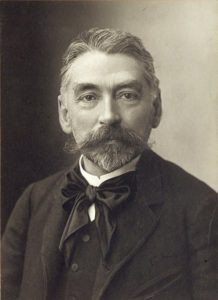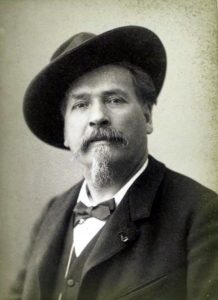
Paul Nadar [Public domain]
As some of you might have guessed, I love poetry and frequently haunt the book section under Rafters Café to see what I can find.
To me poetry is the truest form of writing and the most difficult. I have studied it since my early years and do not pretend to understand all of its forms.
Once of the most difficult poets to read, even in his native French, is Stephane Mallarme (1842-1898) and like many others, I have tried translating his poems into English but have just created a jumbled mess. My French master once joked that in France, people often ask for translations of Mallarme’s work into French. His poetry is, as you can gather, very difficult to read.
I adore the French Symbolist Poets and have read Baudelaire, Rimbaud, Verlaine and many others but Mallarme’s work is the most challenging.
Another rather boring fact about me is that I come from Bradford on Avon in Wiltshire.
But both Bradford on Avon and Stephane Mallarme have a connection which I was made aware of when I was at school. I was told by one of my masters that a great French poet had visited my little town in 1871 but I forgot the poet’s name instantly and it stayed like that for many years.
Later when trying to recall this visit, I thought that either Arthur Rimbaud or Paul Verlaine might have travelled west and for some reason ended up in Bradford on Avon. I knew that these poets had been in London in the 1870s and their close relationship had been so volatile that there was no reason in saying that after another of their bust ups, one of them might have hopped on a train at Paddington and travelled to Bradford on Avon.
But it was not Rimbaud or Verlaine who visited Bradford but the much more sedate Stephane Mallarme.

Histoire du Félibrige [Public domain]
The reason that he travelled from France was to meet his friend William Charles Bonaparte-Wyse (1826-1892) who was also a poet and was living in Bradford on Avon at the time. In a way, it was most probably a good time to be travelling as the Franco-Prussian War (1870-1871) was in full swing and the bloody Paris Commune (March/May 1871) was making Paris a distinctly unpleasant place to be.
Details of Mallarme’s visit are sketchy, but it is recorded that he visited William at his Woolley Hill House address and whilst there, composed his famous poem Dans le Jardin.
As you can tell from his name, William was related to Napoleon being the maternal grandson of Napoleon’s brother Lucien He was actually an Anglo-Irish-French poet who was interested in writing in the Provencal tongue and like the much more well known Frederic Mistral (1830-1914), was a member of the Felibrige.

Tucker Collection [Public domain]
William was also a close friend of Frederic Mistral and the French poet was the godfather of his eldest son. But if you are hoping to find a book of his poems, then please join the queue as I have never seen any of his work at the Arcade. About eight years ago I did see some of Mistral’s work for sale but as I was travelling, I did not purchase it.
Mallarme’s poems do show up from time to time in their original language and in translation as do Baudelaire, Rimbaud, Paul Verlaine and others.
Not so long ago I saw a copy of Les Chants de Maldoror by Isadore Ducasse (Comte de Lautreamont 1846-1870) at the Arcade so if you keep your eyes peeled then these poets do show up.
I was introduced to the French Symbolists at a young age and they changed the way I thought about poetry. It was not however, until I read a biography of Mallarme that I found out that he had visited my home town and composed a poem whilst staying with William.
Who knows, he might have passed through Hungerford on his way to Bradford, although it is likely that he would have travelled via Bath but it is fun to think that he might have glanced at our town as his train steamed through.
These are just some of the fascinating facts to consider if like me you are a poetry buff.
When you visit the Arcade there is always a good selection of poetry books to purchase.
Some of these poets might be well known but others may have just faded into the mists of obscurity.
